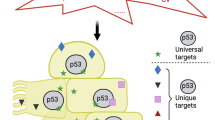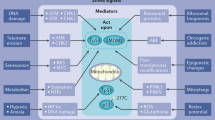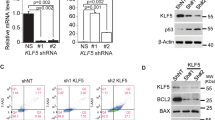Abstract
The tumor suppressor gene p53 plays a major role in regulation of the mammalian cellular stress response, in part through the transcriptional activation of genes involved in cell cycle control, DNA repair, and apoptosis. Many factors contribute to control of the activation of p53, and the downstream response to its activation may also vary depending on the cellular enviroment or other modifying factors in the cell. The complexity of the p53 response makes this an ideal system for application of newly emerging rapid throughput analysis techniques and informatics analysis
This is a preview of subscription content, access via your institution
Access options
Subscribe to this journal
Receive 50 print issues and online access
$259.00 per year
only $5.18 per issue
Buy this article
- Purchase on Springer Link
- Instant access to full article PDF
Prices may be subject to local taxes which are calculated during checkout
Similar content being viewed by others
Author information
Authors and Affiliations
Rights and permissions
About this article
Cite this article
Amundson, S., Myers, T. & Fornace, A. Roles for p53 in growth arrest and apoptosis: putting on the brakes after genotoxic stress. Oncogene 17, 3287–3299 (1998). https://doi.org/10.1038/sj.onc.1202576
Published:
Issue Date:
DOI: https://doi.org/10.1038/sj.onc.1202576
Keywords
This article is cited by
-
The effect of two types of diet on apoptosis indexes, lipid profile and histopathological outcome in acute kidney injury during exercise
BMC Nephrology (2022)
-
The transcription factor PBX3 promotes tumor cell growth through transcriptional suppression of the tumor suppressor p53
Acta Pharmacologica Sinica (2021)
-
Estrogen-related receptor alpha directly binds to p53 and cooperatively controls colon cancer growth through the regulation of mitochondrial biogenesis and function
Cancer & Metabolism (2020)
-
Applying Antibodies Inside Cells: Principles and Recent Advances in Neurobiology, Virology and Oncology
BioDrugs (2020)
-
Mutant p53 regulates LPA signaling through lysophosphatidic acid phosphatase type 6
Scientific Reports (2019)



